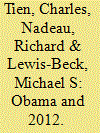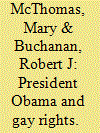|
|
|
Sort Order |
|
|
|
Items / Page
|
|
|
|
|
|
|
| Srl | Item |
| 1 |
ID:
117576


|
|
|
|
|
| Publication |
2012.
|
| Summary/Abstract |
Negative ads have become increasingly common in presidential campaigns. Figure 1 well illustrates this point (see also West 2009). The upcoming 2012 elections will almost surely augment this upward trend of more and more negativity. In fact, with the emergence of Super Pacs, the share of attack ads in 2012 will likely be significantly higher than in 2008, which in and of itself was the high-water mark for attack ads in the modern era. The harsh tone of the battle for the 2012 Republican presidential nomination certainly points toward an exceptionally nasty fall campaign.
|
|
|
|
|
|
|
|
|
|
|
|
|
|
|
|
| 2 |
ID:
116450


|
|
|
|
|
| Publication |
2012.
|
| Summary/Abstract |
Will President Obama lose votes in 2012 because of racial prejudice? For 2008, we estimated, via a carefully controlled, national survey-based study, that on balance he lost about five percentage points in popular vote share due to intolerance for his race on the part of some voters. What about 2012? There are at least three possibilities: (1) the presidency has become postracial, and the vote will register no racial cost; (2) intolerance has increased, and the vote will register an increased racial cost; and (3) intolerance has decreased, and the vote will register a decreased racial cost. Our evidence, drawn from an analysis comparable to that carried out for 2008, suggests Obama will pay a racial cost of three percentage points in popular vote share. In other words, his candidacy will experience a decrease in racial cost, if a small one. In 2008, this racial cost denied Obama a landslide victory. In the context of a closer election in 2012, this persistent racial cost, even smaller in size, could perhaps cost him his reelection.
|
|
|
|
|
|
|
|
|
|
|
|
|
|
|
|
| 3 |
ID:
117579


|
|
|
|
|
| Publication |
2012.
|
| Summary/Abstract |
We examine the role and potential impact of gay, lesbian, and bisexual (GLB) voters in the 2008 and 2012 presidential elections. We look at trend data from 1990 to 2010 to assess the fluctuations in support for the Democratic Party by GLB voters, specifically a substantial decrease in support during the 2010 midterm elections. We use data from the 2008 election to assess the estimated contribution the GLB vote made toward President Obama's margin of victory in key battleground states. Looking at the Obama administration's record on gay rights, specifically the failure to pass the Employment Non-Discrimination Act (ENDA), we argue that the Democratic Party could be held accountable in the 2012 election for their failure to provide protection from employment discrimination based on sexual orientation. Potentially the 2012 election will be closer than the 2008 race, highlighting the importance of the GLB vote to President Obama's reelection in key states. We argue that if President Obama incorporates strong support for ENDA into his reelection platform, the Democratic Party has the chance to recapture the GLB votes it lost in 2010 and maintain enough of the 2008 electoral votes that led to President Obama's victory.
|
|
|
|
|
|
|
|
|
|
|
|
|
|
|
|
|
|
|
|
|